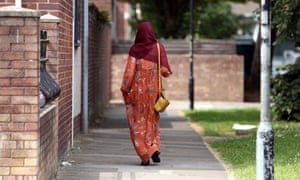Sharia courts have no place in UK family law. Listen to women who know

There must be no religious arbitration in family matters. It leaves minority women vulnerable to control by fundamentalists

A Muslim woman in Cardiff, south Wales.( Photograph: Dimitris Legakis/D Legakis/Athena Picture Agency)
“W e oppose any religious body – whether presided over by men or women – that seeks to rule over us.” So say more than 300 mostly Muslim women, but also others from different faiths who have been abused in their personal lives. These women are voicing their alarm, through a powerful statement published by Open Democracy, about the growing power of religious bodies such as sharia councils, and demand that their voices also be heard in the current debate.
From their own lived experiences, they warn against any attempt to normalise profoundly regressive religious codes of conduct as the basis of social interaction with, and policy development aimed at, minority women. They do so against the backdrop of Louise Casey’s report that warns of minority women who are trapped in abuse and isolation, and two ongoing inquiries into sharia councils: one initiated by the government and the other by the home affairs select committee.
The signatories to the statement have witnessed, experienced or fled from the horrors and degradations of “honour” killings, domestic violence, child and ritual abuse, forced marriage, polygamy, rape and sexual assaults. They speak out against religious impositions that exacerbate their daily struggles to live their lives as they choose. They reject the forces of fundamentalism and patriarchy that seek to divide and govern through surveillance and control of female sexuality.
[Note: The is from The Guardian, which has a strong left-wing bias]
Tags
Who is online
95 visitors

The signatories to the statement have witnessed, experienced or fled from the horrors and degradations of “honour” killings, domestic violence, child and ritual abuse, forced marriage, polygamy, rape and sexual assaults.
They speak out against religious impositions that exacerbate their daily struggles to live their lives as they choose.
They reject the forces of fundamentalism and patriarchy that seek to divide and govern through surveillance and control of female sexuality.
The experiences of these women tell us that the entrenchment of sharia councils and parallel legal systems within minority communities creates a space for the perpetuation of patriarchal control and harm to women, children and others perceived to be apostates, atheists and nonconformists.
The evidence and testimonies gathered from such women have been submitted to the home affairs select committee by Southall Black Sisters and our coalition partners as part of the One Law for All campaign .
Those of us who try to challenge religious laws – on the basis of long-established secular feminist principles, international human rights and gender equality laws – are increasingly labelled “anti-faith”, “unrepresentative” or “Islamophobic”.
These women remind us of the inherent dangers faced by all vulnerable minority women when religious fundamentalists masquerade as “guardians of faith” in order to take control of personal and family relationships. They speak out against the forces that would squeeze out the richness of cultural diversity and the life-affirming values of tolerance, humanity and compassion. As they put it, their ability to freely share and partake in diverse religious and secular traditions, creates “small pieces of happiness” in otherwise relentlessly difficult circumstances .
"Guardians of faith" ; huh?!
Sounds more like guardians of extremism, bigotry, and close-mindedness.
Sounds more like guardians of extremism, bigotry, and close-mindedness.
Dumbassedry; got it.